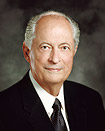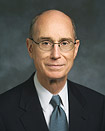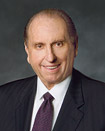Waiting upon the Lord: Thy Will Be Done, by Robert D. Hales
Of the Quorum of the Twelve Apostles

Last night, my wife and I did something that we don't usually do: we had a complain session.
While we weren't complaining about each other or our children (too much), we were comparing the things we loved about previous places we've lived to a few things that we find lacking where we are now. (Please note that there were genuine moments of pure gratitude among the venting.)
As I write this, I'm reminded of something attributed to Elder Neal A. Maxwell:
Letting off steam always produces more heat than light.
Sure, it may not have been the best thing to do, but we both seemed resolved at the end of our discussion to do more to make our current situation better.
And I'm hopeful that we can.
I'm thinking about these complaints (not quite murmurings) because of what I read in Elder Hales' talk about waiting upon the Lord in our trials. He taught that we won't always understand our challenges, but counseled us to "wait upon the Lord."
What, then, does it mean to wait upon the Lord? In the scriptures, the word wait means to hope, to anticipate, and to trust. To hope and trust in the Lord requires faith, patience, humility, meekness, long-suffering, keeping the commandments, and enduring to the end.
Wait means hope.
I don't know about you, but now when I hear HOPE, I'm reminded of the 2008 US presidential election. (Stay with me here) While the style of the tri-colored picture of Barack Obama is now often used in pejorative or comical ways, there was a time when it really did inspire hope.

That was then.
Now that hope is all but dead. That is, if you listen only to critics of President Obama.
However, if you listen to others, you'll hear of economic growth, lowering unemployment numbers, stock values, etc. These factors indicate that the original hope may have been well-founded after all. So long as you didn't hope for a unicorn-riding President Obama to slide down a rainbow and erase the effects of all of your personal bad decisions.

If you were looking for the POTUS-unicorn, consider the above image as fulfillment of your hope. (Or you can ride a unicorn yourself, here.)
Without making any direct comparison between President Obama and the Lord whom we're supposed to wait upon, I submit that it's important to listen to sources that you can trust.
Regarding trust, I trust Elder Hales. Here's a bit of his talk that I found comforting as I'm now trying to improve things that seem lacking in my life (the things discussed in last night's complain session):
Every one of us is more beloved to the Lord than we can possibly understand or imagine. Let us therefore be kinder to one another and kinder toward ourselves.
In this post I mentioned a political figure that I support. If you agree with me, hooray! If not, that's fine. Regardless, here's something I hope we can agree with Elder Hales on:
I bear my special witness that our Savior’s promise is true, for He says, "They that wait upon the Lord shall renew their strength; they shall mount up with wings as eagles; they shall run, and not be weary; and they shall walk, and not faint."
If I ever find myself getting impatient with waiting for certain things to change, I want to remember that the word wait can mean HOPE, and that I know someone worthy of all the hope there is.
(I was talking about Christ there at the end.)














